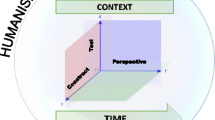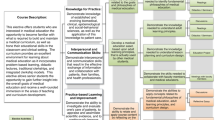Abstract
Background
There is increased emphasis on practicing humanism in medicine but explicit methods for faculty development in humanism are rare.
Objective
We sought to demonstrate improved faculty teaching and role modeling of humanistic and professional values by participants in a multi-institutional faculty development program as rated by their learners in clinical settings compared to contemporaneous controls.
Design
Blinded learners in clinical settings rated their clinical teachers, either participants or controls, on the previously validated 10-item Humanistic Teaching Practices Effectiveness (HTPE) questionnaire.
Participants
Groups of 7-9 participants at 8 academic medical centers completed an 18-month faculty development program. Participating faculty were chosen by program facilitators at each institution on the basis of being promising teachers, willing to participate in the longitudinal faculty development program.
Intervention
Our 18-month curriculum combined experiential learning of teaching skills with critical reflection using appreciative inquiry narratives about their experiences as teachers and other reflective discussions.
Main Measures
The main outcome was the aggregate score of the ten items on the questionnaire at all institutions.
Key Results
The aggregate score favored participants over controls (P = 0.019) independently of gender, experience on faculty, specialty area, and/or overall teaching skills.
Conclusions
Longitudinal, intensive faculty development that employs experiential learning and critical reflection likely enhances humanistic teaching and role modeling. Almost all participants completed the program. Results are generalizable to other schools.
Similar content being viewed by others
References
Institute of Medicine. Improving Medical Education: Enhancing the Social and Behavioral Science Content of Medical School Curricula. Washington, DC: National Academy Press; 2004.
Swing SR. The ACGME outcome project: retrospective and prospective. Med Teach. 2007;29:648–54.
Liaison Committee on Medical Education. Functions and Structure of a Medical School: Standards for Accreditation of Medical Education Programs Leading to the MD Degree. Washington, DC: LCME; 2003.
Irby DM, Cooke M, O’Brien BC. Calls for reform of medical education by the Carnegie Foundation for the advancement of teaching: 1910 and 2010. Acad Med. 2010;85:220–7. doi:10.1097/ACM.0b013e3181c88449.
Branch WT Jr, Frankel R, Gracey CF, Haidet PM, Weissmann PF, Cantey P, Mitchell GA, Inui TS. A good clinician and a caring person: longitudinal faculty development and the enhancement of the human dimensions of care. Acad Med. 2009;84:117–25. doi:10.1097/ACM.0b013e3181900f8a.
Logio LS, Monahan P, Stump TE, Branch WT Jr, Frankel RM, Inui TS. Exploring the psychometric properties of the humanistic teaching practices effectiveness questionnaire, an instrument to measure the humanistic qualities of medical teachers. Acad Med. 2011;86:1019–25. doi:10.1097/ACM.0b013e318221fb9c.
Higgins S, Bernstein L, Manning KD, Schneider J, Kho A, Brownfield E, Branch WT Jr. Through the looking glass: How reflective learning influences the development of young faculty members. Teach Learn Med. 2001;23:238–43. doi:10.1080/10401334.2011.586915.
Hojat M, Gonella JS, Nasea TJ, Mangione S, Vergare M, Magee M. Physician empathy: definition, components, measurement, and relationship to gender and specialty. Am J Psychiatry. 2002;159:1563–9.
Mann K, Gordon J, MacLeod A. Reflection and reflective practice in health professions education: a systematic review. Adv in Health Sci Educ. 2009;14:595–621.
Sprinthall NA. Counseling and social role taking: Promoting moral and ego development. In: Rest JR, ed. Moral development in the profession: Psychology and applied ethics. Hillsdale: Lawrence Erlbaum Associates; 1994:55–100.
Schoen DA. Educating the Reflective Practitioner. San Francisco: Jossey-Bass; 1987.
Mezirow J. Transformative Dimensions of Adult Learning. San Francisco: Jossey-Bass Publishers; 1991.
Rest JR. Background: theory and research. In: JR Rest, ed. Moral Development in the Professions: Psychology and Applied Ethics. Hillsdale: Lawrence Erlbaum Associates; 1994:1–26.
Rest JR, Thomas S. Educational programs and interventions. In: Rest JR, ed. Moral Development: Advances in Research and Theory. New York: Praeger; 1986:59–88.
Kern DE, Wright SM, Carrese JA. Personal growth in medical faculty: a qualitative study. West J Med. 2001;175:92–8.
Peters AS, Greenberger-Rosovsky R, Crowder C, Block SD, Moore GT. Long-term outcomes of the new pathway program at Harvard medical school: a randomized controlled trial. Acad Med. 2000;75:470–9.
Windish DM, Gozu A, Bass EB, et al. A ten-month program in curriculum development for medical educators: Sixteen years of experience. J Gen Intern Med. 2007;22:655–61.
Knight AM, Cole KA, Kern DE, Barker LR, Kolodner K, Wright SM. Long-term follow-up of a longitudinal faculty development program in teaching skills. J Gen Intern Med. 2005;20:721–5.
Frankel R, Eddins-Folensbee F, Inui T. Crossing the patient-centered divide: Transforming healthcare quality through enhanced faculty development. Acad Med. 2011;86:445–52. doi:10.1097/ACM.0b013e31820e7e6e.
Acknowledgments
The corresponding author, William T. Branch, Jr., MD, MACP, FAACH, had full access to all of the data in the study and takes full responsibility for the integrity of the data and the accuracy of the data analysis.
Contributors
None.
Funders
This study was supported by a grant from the Arthur Vining Davis Foundations. The Arthur Vining Davis Foundations had no role in the design and conduct of the study, collection, management, analysis, and interpretation of the data, or the preparation, review or approval of the manuscript.
Previous Presentations
Presented at the Symposium on Health Care Communication, Hong Kong, June 2013.
Ethical Approval
The study received approval or a waiver from the Institutional Review Board of each participating institution.
Conflict of Interest
One of the authors delivered expert witness testimony unrelated to this study.
The other authors declared they have no conflicts of interest.
Author information
Authors and Affiliations
Corresponding author
Rights and permissions
About this article
Cite this article
Branch, W.T., Chou, C.L., Farber, N.J. et al. Faculty Development to Enhance Humanistic Teaching and Role Modeling: A Collaborative Study at Eight Institutions. J GEN INTERN MED 29, 1250–1255 (2014). https://doi.org/10.1007/s11606-014-2927-5
Received:
Revised:
Accepted:
Published:
Issue Date:
DOI: https://doi.org/10.1007/s11606-014-2927-5




